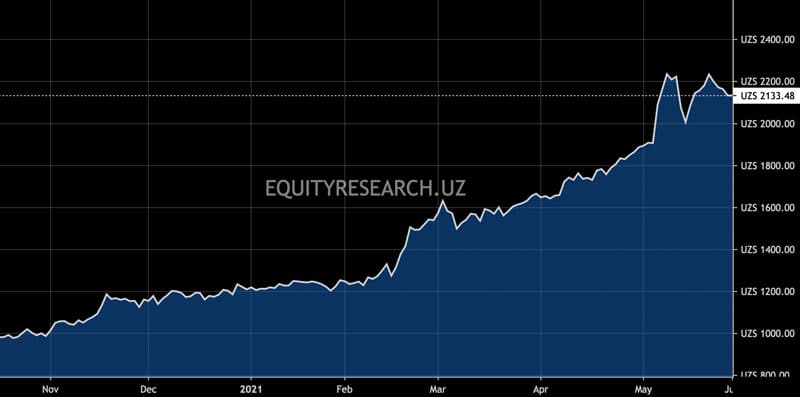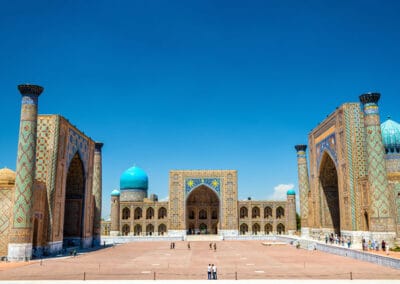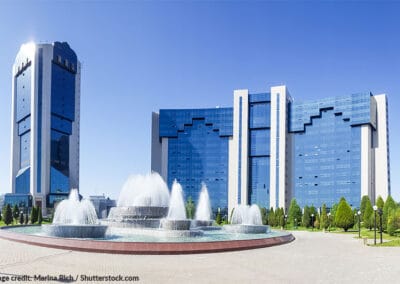0.3% e-commerce penetration rate and a population of 33m, half of which are younger than 25 years. You know what's coming next. E-commerce and tech-related companies in Uzbekistan are a ground-floor opportunity with tremendous upside.
The question is, how to get in? Fear not, Undervalued-Shares.com has the answer, and it doesn't require opening a local brokerage account or travelling to the country.
You will have to be quick, though. The private equity fund featured in this Weekly Dispatch currently has sufficient capacity left to accept new investors, but it will eventually run into capacity constraints. The fund is likely to close to new investors in the not too distant future.
This investment isn't going to be for everyone, but some of my readers will love it.
A unique opportunity among frontier markets
If you have followed Undervalued-Shares.com for a while, you might remember my three-part series about Uzbekistan in early 2019. At the time, I was a delegate in one of the very first investment trips to the country. Our group's presence caused quite a stir, and I even appeared in a fun video published by the Financial Times.
Uzbekistan, you have to know, used to be an inaccessible dictatorship. Until 2016, the country was governed by a strongman, Islam Karimov, who had survived since the fall of the Soviet Union. Political opponents were boiled alive (literally), and foreign investment was not allowed.
All that changed with Karimov's sudden, unexpected death in 2016. His successor surprised the world by launching wide-ranging political reforms, such as allowing private property ownership, making the national currency fully convertible, and introducing very low tax rates geared towards legalising black market operators and increasing tax revenue.
Uzbekistan has been attracting attention ever since. It was the last major country to shake off the Soviet era, which meant that much of its economy had to be rebuilt from scratch. Pioneer investors smelled what pioneer investors like best – an undervalued ground-floor opportunity with the potential to grow your investment 10, 50 or 100-fold if you got in early and had the stomach to remain invested for the long haul.
My friend and fellow blogger, Ladislas Maurice aka The Wandering Investor, was among those who invested in Uzbek stocks, but for most ordinary investors, investing in the local stock market wasn't practical.
The investment landscape of the country is changing rapidly, though. Now is an interesting point in time to revisit the subject.
Far-reaching reforms to kickstart the stock market
In part 3 of my 2019 blog series, I described why Uzbekistan had a surprisingly diverse stock market. During the early 1990s, the country had briefly flirted with economic reforms. Formerly state-owned companies issued privatisation vouchers, which gave ordinary Uzbekis a stake in the country's economy. Karimov subsequently stopped these privatisations, but the Tashkent Stock Exchange stayed open throughout his entire reign, if only on paper.
The Uzbek stock market had 200 listed companies when I visited. However, the combined market capitalisation of all Uzbek companies was just USD3bn at the time, about the equivalent of a medium-sized British retail company. The market's daily trading volume of USD 50,000 was miniscule – that's USD 50,000 of daily trading across the entire market, not a single stock!
During the ensuing two and a half years, things have developed somewhat. There are now about 10,000 domestic retail investors who trade Uzbek stocks through local brokerage firms, predominantly Freedom Finance. Trading volume on the market has recently doubled to about USD 100,000 per day.
One of the employees of Freedom Finance, Bekhruzbek Ochilov, has set up a website to help make the market more transparent. EquityResearch.uz has become the central information hub for brokerage research on Uzbek companies. So far, it's only available in Russian, but an English version is said to be in the making. As Ochilov puts it on his LinkedIn profile, he is out to "Make Uzbek Wall Street happen". Godspeed to him!
EquityResearch.uz also provides the very first attempt of publishing an index for Uzbek stocks. Over the past seven months, this index has more than doubled, with some individual stocks doing particularly well. Kizilkumcement, for example, has gone up four-fold over the year and it was even liquid enough to get a trade in.

The Uzbek stock market index provided by EquityResearch.uz.
There is a good chance of more to come. A few weeks ago, Uzbekistan's president, Shavkat Mirziyoyev, launched a new push to develop the Uzbek capital markets by introducing sweeping reforms. Mirziyoyev wants to IPO a few large, relatively sexy state-owned companies to make the Uzbek stock market more liquid and more prominent. The county will also push to have some of these companies included on the MSCI Frontier Index Watch List, to raise their profile among foreign institutional investors.
Not all of this is going to go smoothly, and delays are bound to happen. Still, Uzbekistan does represent one of the world's most interesting frontier country opportunities. The country has a large population of 33m, a high level of education, and it lies at the crossroads of an exciting economic region. This combination is not easy to find. Most of the time, frontier countries suffer from small population numbers and a lack of economies of scale. One of the reasons why I keep coming back to Uzbekistan is my firm belief that it's one of THE frontier markets for investors to look at.
How to get in it, though, when it requires a local brokerage account and Russian language skills?
Just as in the case of Iran, there is a potential backdoor route that you can use. It works via London, requires a minimum investment of EUR 100,000 (required by the regulatory authorities), and gives you an opportunity to be there right from the start when the most interesting companies are started.
The tech opportunity in frontier markets
Early bets on tech companies in emerging markets and frontier countries are the kind of opportunity where you could make 10, 50 or 100 times your money over the course of a decade. I demonstrated as much in my three-part blog series "Digital Decolonisation – A rock star investment theme for the 2020s?".
Uzbekistan offers exactly that. Right now, only 0.3% of the country's retailing is done online. This compares to e-commerce having a market share of 20% in the US, 30% in the UK, and over 50% in China.
Uzbekistan has the right demographics for e-commerce to take off over the coming years. Around 50% of the country's population of 33m are under the age of 25. Like everywhere else, the young want smartphones, convenience, and new services. Entrepreneurs tapping into these needs will experience a lot of tailwind.
The low penetration rate of modern industries stretches across the entire Uzbek economy. Just half of the population have a bank account, and only 5% have ever taken out a formal loan. Imagine a company offering microloans online, and similar services.
Pioneer countries have one crucial advantage over developed countries that investors benefit from: there is hardly any competition for start-ups as they are often created in industries that don't exist yet (unlike in developed countries, where start-ups primarily disrupt existing, more established businesses).
There is also less competition among funders. Imagine being a start-up funder in Uzbekistan – where would you turn to raise seed capital? If you are one of the very few established funders in such a country, you can do deals on conditions that simply wouldn't be available elsewhere.
London-based Sturgeon Capital manages a range of funds in pioneer markets, and it is the only Western fund manager to have had a continuous presence in Uzbekistan for nearly a decade.
The company's founder had recognised the opportunity to invest in venture capital in Uzbekistan long before anyone else. In 2016 already, Sturgeon Capital launched a dedicated fund for technology-related opportunities in Uzbekistan. With USD 5m in investments, this particular Sturgeon fund was relatively small at the time. However, those investors who had the foresight to get in back then did reap considerable rewards. The private companies that this fund invested in have increased in value by three to 14 times, and the overall portfolio has produced a gross performance of 34% p.a. since the fund's inception.
Given that fund's success and growing demand for exposure to Uzbekistan, Sturgeon Capital launched another fund dedicated to this particular opportunity. The Sturgeon Uzbekistan Growth Equity Fund ("SUGEF") invests 100% of its money in privately-held, technology-enabled companies. It was designed as an exclusive, niche product. The fund is a Guernsey-based entity and it was launched in June 2020. Since then, it has raised a double-digit million amount from high-net-worth individuals and family offices with experience in this particular geographic area.
For now, this new fund will probably raise EUR 30m and then close to new investors until further notice. Uzbekistan is a small country after all, and the fund's manager wanted to focus on picking the best opportunities while many parts of the country's economy are still in their infancy. Funding small- and medium-sized enterprises is the SUGEF's sweet spot, because that's where other international investors – now that they have started to arrive in Uzbekistan – won't be looking yet.
I spoke to the company's CEO, Kiyan Zandiyeh, while I was in London. Kiyan is getting a steady stream of enquiries from potential investors, and he expects that the fund will have to announce its soft closing before the end of the year, possibly a lot sooner.
SUGEF aims for a growth factor of five to seven over the next five to seven years, which would make for an annual return of investor funds of around 40% p.a. Along the way, Kiyan would like his fund to create 500,000 new jobs in the Uzbek economy. Kiyan is passionate about the difference such a fund can make to the lives of ordinary people in the countries he invests in. For him, doing good and doing well go hand in hand.
Will he be able to pull it off?
Needless to say, Uzbekistan comes with its own set of risks. It’s a pioneer market, after all. You don't get to make use of such an opportunity without accepting the risks that come with it. Some would say, though, that buying stakes at low valuations in nascent industries is actually lower risk than buying FAANG stocks at sky-high valuations. In any case, it's safe to say that start-ups in Uzbekistan are an uncorrelated asset. If you want to diversify your holdings and include countries that are in a totally different part of the cycle than the rest of the world, then this is a possibility to look at.
In any case, SUGEF's PowerPoint presentation makes for insightful reading. You can contact Sturgeon Capital via their website and ask for a copy of it.
You can also check out the Boston Consulting Group's seminal 2019 report on Uzbekistan, the World Bank's 2019 report "Uzbekistan: Towards a new economy", or the International Monetary Fund's April 2021 country report on Uzbekistan to help make up your mind.
An opportunity that will fit some (like a glove)
Investing in Uzbekistan right now is probably akin to investing in Poland in the 1990s. As a Westerner, it's easy to discard such countries as too underdeveloped, too difficult to access, or too risky. Then again, look at what has happened in Poland since. Had you picked up cheap assets in Germany's neighbouring country back in those days, you'd now be sitting pretty. Like in Poland, the unusually high level of education among Uzbeks is likely going to play a role. A pioneer market has a much higher chance of succeeding if you are dealing with an educated populace.
Uzbekistan has the largest population of any country in Central Asia, and it had been closed off from the rest of the world until recently. There is a possibility that it will now catch up even faster, given that in the era of the Internet and globalised financial markets, things can happen a lot quicker.
For anyone who fancies the concept and has the spare cash, SUGEF is about as good an opportunity as you will find. I am not affiliated with Sturgeon Capital and don't get compensation for featuring the fund, but I have known the company's founder and staff for years which is why I feel comfortable pointing you towards them.
As to everything else, it's in your hands. I provide inspiration and information, but you have to make your own investment decisions. No doubt, in a few years, I'll check back on Uzbekistan, SUGEF, and the entire story of another pioneer market working to create its own digital champions. By then, some of SUGEF's private market investments might have IPOed on the Tashkent Stock Exchange.
And I might even be back there sooner, if the president's stock market reforms take off. It's also a great country for travelling, in case you wondered.
Blog series: How to invest in frontier countries
There's more to "How to invest in frontier countries" than this Weekly Dispatch. Check out my other articles of this three-part blog series.
Did you find this article useful and enjoyable? If you want to read my next articles right when they come out, please sign up to my email list.
Share this post:
The next Argentinean crisis investing opportunity
If you like buying the dollar for 10 pence, you will love my latest find from Argentina!
At its current bombed-out price, it offers limited downside and massive upside. Even as a deep-value play, the stock should recover 100-300% over 1-2 years. It may even become a 10-bagger, longer term. Crisis investing at its best!
My latest report for Undervalued-Shares.com Lifetime Members has all the details.

















